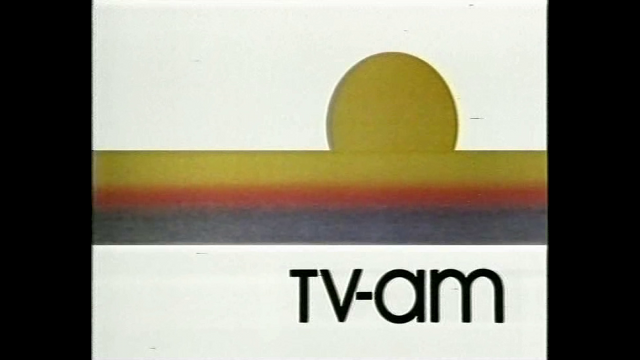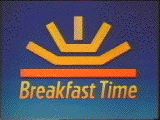 There had been occasional attempts at breakfast television in the UK previously (Yorkshire Television’s Good Morning Calendar for ITV (Yorkshire region only) in 1977 and later on BBC1’s Swap Shop tried an earlier start with AM-UK), but the market for breakfast television was still considered to be limited in the UK because it was thought that most people might be too busy to watch television at that time of the day. Once a commercial breakfast television franchise had been created and awarded to TV-am in 1980 alongside other ITV franchise changes, TV-am’s launch was scheduled for 1 February 1983 in order to avoid the other ITV franchise changes at the start of 1982 as well as the launch of Channel 4 the following November. However the BBC decided to get in first with a ‘spoiler’ programme, namely Breakfast Time on BBC1 which launched a month earlier, and much to TV-am’s dismay (they were due on air shortly) it was not the serious news programme some thought it might have been, but was a direct competitor which helped to hit TV-am’s initial viewing figures badly. Later on, Breakfast Time was scrapped and replaced with a more serious BBC Breakfast News format.
There had been occasional attempts at breakfast television in the UK previously (Yorkshire Television’s Good Morning Calendar for ITV (Yorkshire region only) in 1977 and later on BBC1’s Swap Shop tried an earlier start with AM-UK), but the market for breakfast television was still considered to be limited in the UK because it was thought that most people might be too busy to watch television at that time of the day. Once a commercial breakfast television franchise had been created and awarded to TV-am in 1980 alongside other ITV franchise changes, TV-am’s launch was scheduled for 1 February 1983 in order to avoid the other ITV franchise changes at the start of 1982 as well as the launch of Channel 4 the following November. However the BBC decided to get in first with a ‘spoiler’ programme, namely Breakfast Time on BBC1 which launched a month earlier, and much to TV-am’s dismay (they were due on air shortly) it was not the serious news programme some thought it might have been, but was a direct competitor which helped to hit TV-am’s initial viewing figures badly. Later on, Breakfast Time was scrapped and replaced with a more serious BBC Breakfast News format.
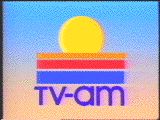 TV-am followed swiftly afterwards, launched with a barrage of publicity on 1st February 1983. It featured a mixture of familiar and unfamiliar presenters (David Frost being the key figure) and had a ‘bright and breezy’ approach to waking the nation up in the morning. Expectations were set high for the new service, but in reality there were several unanswered questions; most notably just how many people in the UK were prepared to watch television instead of listening to the radio at that time of day especially given the BBC1 competition.
TV-am followed swiftly afterwards, launched with a barrage of publicity on 1st February 1983. It featured a mixture of familiar and unfamiliar presenters (David Frost being the key figure) and had a ‘bright and breezy’ approach to waking the nation up in the morning. Expectations were set high for the new service, but in reality there were several unanswered questions; most notably just how many people in the UK were prepared to watch television instead of listening to the radio at that time of day especially given the BBC1 competition.
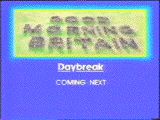 The main breakfast show’s title Good Morning Britain – a title since revived by ITV but with no connection to the TV-am original – deliberately echoed the similar US programme Good Morning America, and the British show had much in common with its American counterpart, such as the use of an on-screen clock, and the use of a caption to tell viewers what was to follow the commercial break. TV-am also made other programmes to show during its allocated time slot, such as Daybreak (the same title also used much later by ITV for its unconnected breakfast show), Data Run, and Wacaday presented by Timmy Mallet.
The main breakfast show’s title Good Morning Britain – a title since revived by ITV but with no connection to the TV-am original – deliberately echoed the similar US programme Good Morning America, and the British show had much in common with its American counterpart, such as the use of an on-screen clock, and the use of a caption to tell viewers what was to follow the commercial break. TV-am also made other programmes to show during its allocated time slot, such as Daybreak (the same title also used much later by ITV for its unconnected breakfast show), Data Run, and Wacaday presented by Timmy Mallet.
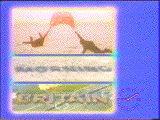 After the commercial break had finished, this caption was shown, which also features the on-screen clock (showing ten past nine, in the bottom-right hand corner). By April TV-am’s future looked bleak – viewing figures had plummeted to about 100,000, partly courtesy of what was considered to be surprisingly strong competition from Breakfast Time. (Anyone remember Russell Grant’s horoscopes?) So Greg Dyke was brought in from London Weekend Television to try and improve things – David Frost was replaced by Nick Owen and TV-am went downmarket, successfully reversing the drop.
After the commercial break had finished, this caption was shown, which also features the on-screen clock (showing ten past nine, in the bottom-right hand corner). By April TV-am’s future looked bleak – viewing figures had plummeted to about 100,000, partly courtesy of what was considered to be surprisingly strong competition from Breakfast Time. (Anyone remember Russell Grant’s horoscopes?) So Greg Dyke was brought in from London Weekend Television to try and improve things – David Frost was replaced by Nick Owen and TV-am went downmarket, successfully reversing the drop.
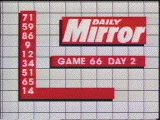 At the time there was a craze among tabloid newspapers for running bingo competitions, so a bright idea was to tell the viewers what the day’s numbers were so they didn’t have to buy the newspaper. Occasionally the numbers were misread, though any mistakes were inevitably corrected. Nick Owen bizarrely had to dress up in a beefeater’s outfit and blow a trumpet to introduce this part of the programme!
At the time there was a craze among tabloid newspapers for running bingo competitions, so a bright idea was to tell the viewers what the day’s numbers were so they didn’t have to buy the newspaper. Occasionally the numbers were misread, though any mistakes were inevitably corrected. Nick Owen bizarrely had to dress up in a beefeater’s outfit and blow a trumpet to introduce this part of the programme!
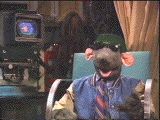 Roland Rat was also introduced as part of the April shake-up. Created by David Claridge and introduced to TV-am by Anne ‘Teletubbies’ Wood, Roland Rat proved to be very popular with the viewers and gave the breakfast start-up a much needed shot in the arm. Rat mania even spawned two UK Top 40 records in 1983/4 – Rat Rapping and Love Me Tender. Anne Diamond also had to work alongside ‘Roland Rat Superstar’ which must have been a tough act to keep up with! Thankfully Roland Rat is still very much alive today…
Roland Rat was also introduced as part of the April shake-up. Created by David Claridge and introduced to TV-am by Anne ‘Teletubbies’ Wood, Roland Rat proved to be very popular with the viewers and gave the breakfast start-up a much needed shot in the arm. Rat mania even spawned two UK Top 40 records in 1983/4 – Rat Rapping and Love Me Tender. Anne Diamond also had to work alongside ‘Roland Rat Superstar’ which must have been a tough act to keep up with! Thankfully Roland Rat is still very much alive today…
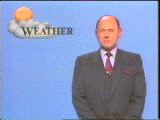 The weather forecast was presented by Commander Philpott, whose style was certainly different from the competition – come to think of it anything else past or present. ‘Stiff upper lip British’ was perhaps the best way to describe the Commander’s technique.
The weather forecast was presented by Commander Philpott, whose style was certainly different from the competition – come to think of it anything else past or present. ‘Stiff upper lip British’ was perhaps the best way to describe the Commander’s technique.
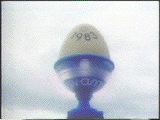 This caption was shown at the end of the programme, with one egg cup added to the picture for each year since 1983 (1984 = two egg cups displayed, etc.), though in later years only a few of the cups actually appeared in the caption. TV-am was a programme contractor in its own right, and was independent of the other companies that formed the ITV network.
This caption was shown at the end of the programme, with one egg cup added to the picture for each year since 1983 (1984 = two egg cups displayed, etc.), though in later years only a few of the cups actually appeared in the caption. TV-am was a programme contractor in its own right, and was independent of the other companies that formed the ITV network.
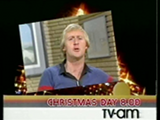 TV-am also promoted its shows at other times on the ITV network, with this example promoting Chris Tarrant and Roland Rat appearing on Christmas Day 1984 and a Princess Anne interview shown on Boxing Day.
TV-am also promoted its shows at other times on the ITV network, with this example promoting Chris Tarrant and Roland Rat appearing on Christmas Day 1984 and a Princess Anne interview shown on Boxing Day.
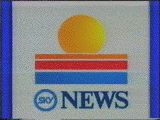 TV-am did its own news gathering in early years, but later on the news was provided by Rupert Murdoch’s Sky News until TV-am’s demise at the end of 1992.
TV-am did its own news gathering in early years, but later on the news was provided by Rupert Murdoch’s Sky News until TV-am’s demise at the end of 1992.
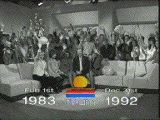 TV-am were among the losers when the ITV broadcasting franchises were reviewed in 1991, so from the 1st January 1993 TV-am was replaced by GMTV. This picture was the very last to be transmitted by TV-am; the colour of the main scene was faded moments before the picture faded abruptly. An era had come to an end.
TV-am were among the losers when the ITV broadcasting franchises were reviewed in 1991, so from the 1st January 1993 TV-am was replaced by GMTV. This picture was the very last to be transmitted by TV-am; the colour of the main scene was faded moments before the picture faded abruptly. An era had come to an end.
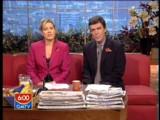 TV-am’s replacement, GMTV (which prior to 2004 was part-owned by Carlton, Granada and Disney) to begin with tried to establish its own identity but slowly evolved over the years into something that looks very similar to TV-am, and also provided signed news and additional cartoons on ITV2 during the same timeslot for a while under the GMTV2 banner, though (like TV-am) GMTV and ITV are technically two separate entities that just happen to use the same channel. Whilst GMTV was a separate entity from ITV, if ITV wanted to ‘borrow’ time from GMTV in order (for example) to show a sporting event, it had to compensate GMTV somehow (either financially or by giving GMTV additional air time) as a result. GMTV ceased to exist after ITV plc bought out Disney’s share of the broadcaster and what was still a physically separate commercial television franchise became fully integrated into the ITV channel as Daybreak. Later on the separate breakfast franchise was abolished by the Digital Economy Act and Daybreak has since been replaced by Good Morning Britain; nothing to do with TV-am but using the same name as TV-am’s original breakfast show.
TV-am’s replacement, GMTV (which prior to 2004 was part-owned by Carlton, Granada and Disney) to begin with tried to establish its own identity but slowly evolved over the years into something that looks very similar to TV-am, and also provided signed news and additional cartoons on ITV2 during the same timeslot for a while under the GMTV2 banner, though (like TV-am) GMTV and ITV are technically two separate entities that just happen to use the same channel. Whilst GMTV was a separate entity from ITV, if ITV wanted to ‘borrow’ time from GMTV in order (for example) to show a sporting event, it had to compensate GMTV somehow (either financially or by giving GMTV additional air time) as a result. GMTV ceased to exist after ITV plc bought out Disney’s share of the broadcaster and what was still a physically separate commercial television franchise became fully integrated into the ITV channel as Daybreak. Later on the separate breakfast franchise was abolished by the Digital Economy Act and Daybreak has since been replaced by Good Morning Britain; nothing to do with TV-am but using the same name as TV-am’s original breakfast show.
